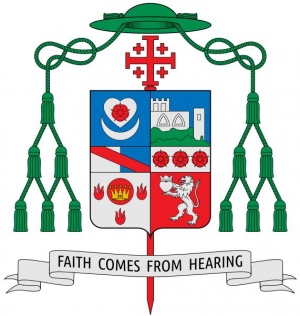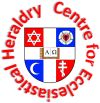Jeffrey Marc Monforton: Difference between revisions
Knorrepoes (talk | contribs) m (Text replacement - "Arms of {{PAGENAME}}" to "Arms (crest) of {{PAGENAME}}") |
Knorrepoes (talk | contribs) m (Text replacement - "{{rel}}" to "{{religion}}") |
||
| Line 29: | Line 29: | ||
The achievement is completed with the heraldic insignia of a prelate of the rank of bishop by instruction of the Holy See, of March 1969, confirmed in March 2001. | The achievement is completed with the heraldic insignia of a prelate of the rank of bishop by instruction of the Holy See, of March 1969, confirmed in March 2001. | ||
{{ | {{religion}} | ||
{{media1}} | {{media1}} | ||
Revision as of 11:59, 25 July 2023
JEFFREY MARC MONFORTON
Born : May 5, 1963
Deceased :
Bishop of Steubenville, 2012-present
Official blazon
The arms of the Diocese of Steubenville impaled with the personal arms: Tierced per fess, in chief Azure clair; fess Argent; Base point Gules. Charged in chief; Forte rune de Montagne Gris, sur une colline Vert. Fess triade de roses Gules. Base point, lion rampant Gris, tenant a crowned vulned heart Gris.
Origin/meaning
As common in US episcopal heraldry, the arms show the arms of the diocese impaled with the personal arms of the bishop.
The bishop 's personal coat of arms consists of three fields. The chief depicts the Mivtzar Monfor, a ruined crusader castle in the upper Galilee region of nortbern Israel. The name of the fortress derives from two French words - mont (mountain) and fort (strong), meaning "strong mountain." Built by the French at the beginning of the second millennium , the castle name comes from the same derivation as the Brittany family name of Bishop Monforton. Bishop Monforton's family on his father's side traces their heritage to the Brittany area of northwestern France. His ancestors emigrated from there to Canada almost 400 years ago.
Although Montfort Castle in Galilee saw some military use during the Middle Ages when it passed into Teutonic and later Baibar hands, it was primarily noted for its agricultural significance. In Jesus' time, Galilee was the site of many of his miracles and agricultural parables. It remains a most fertile and productive area of the Holy Land.
The center contains three red roses. They pay tribute to St. Therese of Lisieux, the patroness of the National Shrine of the Little Flower in Royal Oak, Mich. - where Bishop Monforton had his first priestly assignment - and the patroness of Bishop Monfonon's first pastorate, St. Therese of Lisieux Parish, in Shelby Township, Mich. In her autobiography, St. Therese wrote, "My mission - to make God loved - will begin after my death. I will spend my heaven doing good on earth. I will let fall a shower of roses." Roses have been described as St. Therese's symbols.
The base point features a lion. The lion is found on the coat of arms of the English branch of the Monforton family. But in the application used for Bishop Monforton, the lion is not fighting: instead he holds a crowned, wounded heart in its front paws. This symbolises the Sacred Heart Major Seminary in Detroit, Mich., where Bishop Monforton was the rector and president for six years.
Above and behind the shield appears a processional cross which further reinforces the theme of " bishop and his people as pilgrims" - persons on the move for the sake of the Lord's kingdom. The cruciform used here is that of the Jerusalem Cross. It consists of a central cross signifying the city of Jerusalem from which the faith spread, surrounded by four minor crosses. It was part of the coat of arms of the short-lived Jerusalem Kingdom (A.D. l099-1203). The red color represents Christ's sacrifice for his people. The Jerusalem Cross is used today by the Equestrian Order of the Holy Sepulchre of Jerusalem, a fraternal, charitable organization charged by the Vatican with the task of providing for the needs of the Latin Patriarchate of Jerusalem, and for all the activities and initiatives which are necessary to support the Christian presence in the Holy Land. Bishop Monforton was inducted into the Equestrian Order of the Holy Sepulchre in 2011, and thus merits the use of the red Jerusalem Cross.
The motto is a passage from St. Paul's Letter to the Romans: "Faith Comes From Hearing.
The achievement is completed with the heraldic insignia of a prelate of the rank of bishop by instruction of the Holy See, of March 1969, confirmed in March 2001.
Religious or Ecclesiastical heraldry portal
This page is part of the Ecclesiastical heraldry portal |
Heraldry of the World |
|
Catholic heraldry
|
Other Christian churches Other religions
|
Literature : The Steubenville Register September 7, 2012


